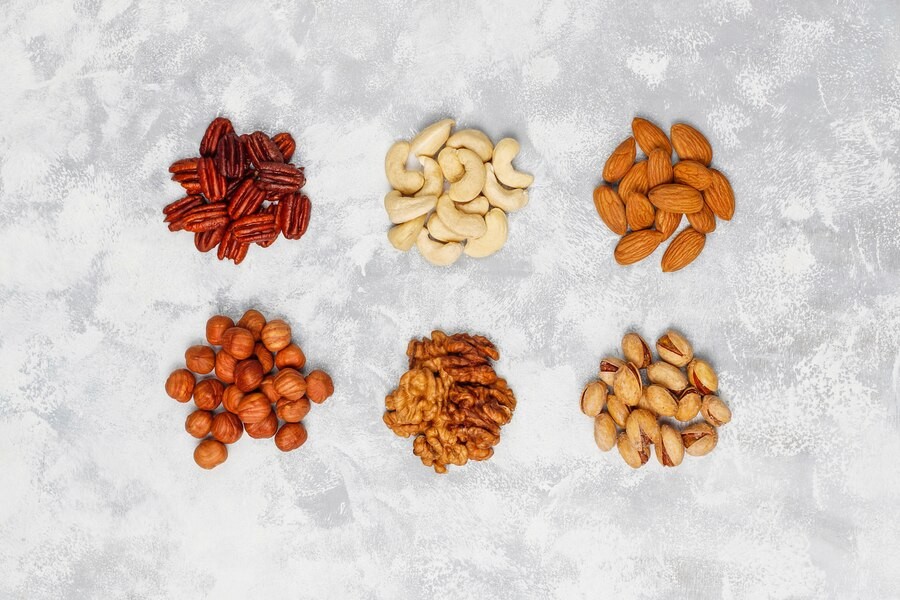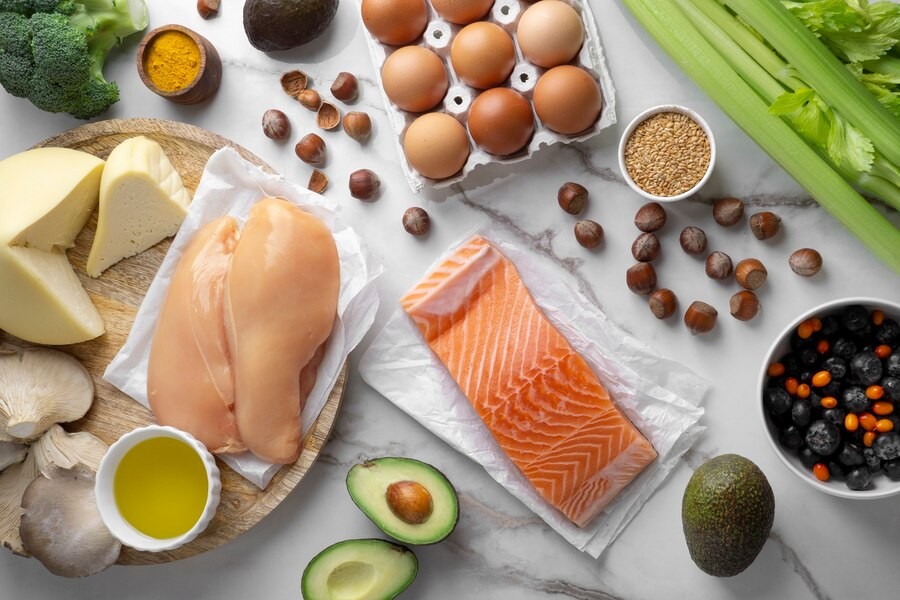Selain protein hewani, protein nabati yang terdapat dalam kacang-kacangan juga memiliki banyak manfaat bagi kesehatan. Meskipun kandungan protein nabati tidak selengkap protein hewani, berbagai zat lainnya seperti serat, vitamin, mineral, dan antioksidan, yang terkandung di dalamnya menawarkan manfaat kesehatan yang tidak kalah penting.
Kacang dengan Urutan Kandungan Protein Paling Tinggi
Meskipun kacang-kacangan merupakan sumber protein nabati yang sangat bermanfaat, penting untuk diketahui bahwa kandungan protein di setiap jenis kacang berbeda-beda. Berikut ini adalah jenis-jenis kacang dengan kandungan protein tertinggi:
Kacang tanah
Kacang tanah menempati urutan teratas dalam hal kandungan protein. Dalam setiap 100 gram kacang tanah mentah, terdapat sekitar 25 gram protein.
Selain itu, kacang tanah juga kaya akan lemak sehat dan vitamin E, yang bermanfaat bagi kesehatan kulit dan jantung. Produk olahan seperti selai kacang dapat menjadi pilihan konsumsi harian yang praktis, namun pastikan untuk memilih yang rendah gula untuk manfaat yang optimal.
Kacang almon
Kacang almon berada di urutan kedua tertinggi kandungan proteinnya. Dalam setiap 100 gram kacang almond terdapat sekitar 21 gram protein.
Almon juga kaya akan kalsium, magnesium, dan vitamin E, yang mendukung kesehatan tulang dan fungsi otak. Kacang ini sangat cocok dijadikan camilan sehat atau ditambahkan ke dalam sereal, yoghurt, atau smoothies untuk meningkatkan asupan protein harian.
Baca Juga: Rekomendasi Kacang Rendah Karbohidrat, Cocok bagi Pelaku Diet Low Carb
Kacang pistachio
Kacang pistachio mengandung sekitar 20 gram protein per 100 gramnya. Selain kaya protein, kacang ini juga memiliki kandungan kalori yang lebih rendah dibandingkan dengan jenis kacang lainnya, yang menjadikannya pilihan tepat untuk Anda yang ingin menjaga berat badan. Pistachio juga kaya akan serat, vitamin B6, dan antioksidan, yang bermanfaat untuk kesehatan jantung dan pencernaan.
Kacang mede
Kacang mede mengandung sekitar 18 gram protein per 100 gramnya. Kacang mede juga diperkaya oleh zat besi, magnesium, dan zinc yang baik bagi kesehatan tubuh, terutama dalam meningkatkan imunitas dan menjaga fungsi saraf.
Dengan rasa gurih yang khas, kacang mede sering dijadikan camilan sehat atau bahan tambahan dalam berbagai masakan. Namun, karena kandungan kalorinya cukup tinggi, disarankan untuk mengonsumsinya dalam jumlah yang terkontrol.
Kacang kenari
Kacang kenari atau disebut dengan walnut memiliki kandungan protein sekitar 15 gram per 100 gramnya. Selain itu, kenari juga dikenal akan asam lemak omega-3 yang sangat baik bagi kesehatan jantung dan otak.
Baca Juga: 7 Kebaikan Kacang Hijau Untuk Kesehatan
Kacang hazelnut
Kacang hazelnut mengandung sekitar 14 gram protein per 100 gramnya. Kacang ini juga kaya akan vitamin E, serat, dan antioksidan yang membantu menjaga kesehatan kulit dan melindungi tubuh dari radikal bebas.
Hazelnut sering digunakan dalam pembuatan cokelat, selai, dan berbagai produk olahan lainnya. Selain itu, kacang ini juga menjadi bahan yang sempurna untuk pembuatan kue, memberikan rasa dan tekstur yang nikmat.
Kacang pecan
Kacang pecan memiliki kandungan protein sekitar 9 gram per 100 gram. Namun, jenis kacang ini cukup sulit ditemukan di Indonesia. Meskipun kandungan proteinnya lebih rendah dibanding kacang lainnya, pecan tetap menjadi sumber lemak sehat, serat, dan antioksidan yang baik untuk kesehatan jantung. Kacang ini sering digunakan sebagai bahan tambahan dalam kue.
Untuk meningkatkan kebutuhan protein Anda, Anda bisa mengganti camilan manis dengan jenis kacang-kacangan yang telah disebutkan di atas. Konsumsi dalam porsi yang tepat dan hindari menambahkan gula agar mendapatkan manfaat maksimal tanpa risiko kelebihan kalori.
Memiliki pertanyaan lain terkait dengan kebutuhan protein harian? Anda bisa memanfaatkan layanan konsultasi kesehatan Ai Care dengan mengunduhnya melalui App Store atau Play Store.
Mau tahu informasi seputar nutrisi, makanan dan tips diet lainnya? Cek di sini, ya!
- dr Nadia Opmalina
Lauren O'Connor, MS, RDN (2024). Which Nuts Are the Highest in Protein?. Available from: https://www.health.com/high-protein-nuts-8727584
Better Health. Nuts and seeds. Available from: https://www.betterhealth.vic.gov.au/health/healthyliving/nuts-and-seeds
Mayo Clinic (2023). Nuts and your heart: Eating nuts for heart health. Available from: https://www.mayoclinic.org/diseases-conditions/heart-disease/in-depth/nuts/art-20046635
Johna Burdeos, RD (2024). Health Benefits of Peanuts. Available from: https://www.health.com/peanuts-benefits-8684155
WebMD (2023). Health Benefits of Almonds. Available from: https://www.webmd.com/diet/health-benefits-almonds
Jillian Kubala, RD (2024). Health Benefits of Pistachios. Available from: https://www.health.com/pistachios-8423108
WebMD (2023). Health Benefits of Cashews. Available from: https://www.webmd.com/diet/health-benefits-cashews
Cynthia Sass, MPH, RD (2023). 8 Health Benefits of Walnuts. Available from: https://www.health.com/nutrition/walnut-benefits
Arlene Semeco, MS, RD (2023). 7 Ways Hazelnuts Benefit Your Health. Available from: https://www.healthline.com/nutrition/hazelnut-benefits
Rita Colorito and Amy Gopal (2024). Health Benefits of Pecans. Available from: https://www.webmd.com/diet/health-benefits-pecans












